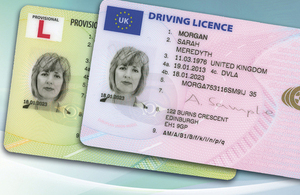Graduated Driving Licences – back on the road safety agenda …
The prime minister has asked the Department for Transport to explore the introduction of graduated licensing for newly-qualified drivers.
Speaking in Parliament on 7 February, Theresa May said ‘too many people suffer loss and tragedy at the hands of learner drivers’.

Raising the issue, Jenny Chapman, the Labour MP for Darlington, said that one in four young drivers are involved in an accident within the first two years of passing their test, and young drivers are involved in 400 road deaths or serious injuries each year.
She asked Ms May whether she would consider the introduction a graduated licensing system for the UK.
The prime minister said: “I will certainly look at the request that she has made and I will also ask the Department for Transport to look at this as an issue.
“As she says too many people suffer loss and tragedy at the hands of learner drivers in this circumstance and we will certainly look at that.”
Already in place in countries such as Australia and New Zealand, graduated driver licensing (GDL) involves placing restrictions on new drivers which can include: a ban on driving in the evening and at night, limiting the number of passengers in a vehicle and reducing maximum speeds.
Newly qualified drivers acquire a full licence once they have gained sufficient experience on the road.
In October 2017, a Welsh Assembly member expressed his frustration that the UK Government is not considering introducing a GDL system, which he describes as a ‘potential game changer for road safety’.
The move has been backed by the RAC, who described GDL as a ‘very positive step towards preventing the loss of young lives on our roads’.
Pete Williams, RAC road safety spokesperson, said: “The RAC has been calling for a reform of driving education for young people and the introduction of graduated driving licences… so this is a very positive step towards preventing the loss of young lives on our roads.
“Evidence from other countries where some form of graduated driver licensing is used shows that it has been successful in reducing the number of collisions involving young drivers, but in order for it to be as effective as possible it has to be part of an overall package of measures including more extensive driver education.”
Brake is also encouraged by the announcement, saying the current system is ‘not fit for purpose’.
Joshua Harris, Brake’s director of campaigns, said: “Ensuring that novice drivers have the skills and experience to drive safely on all types of roads, and in all scenarios, is an urgent priority. Our current licensing system is not fit for purpose and throws newly-qualified drivers in at the deep-end, at great risk to themselves and others.
“We are encouraged that the Government will look into the issue of Graduated Driver Licensing, however, this process must result in positive change. Young and novice drivers are involved in a disproportionate number of road crashes and the introduction of a comprehensive Graduated Driver Licensing system is critical to reverse this trend.
“Brake is calling upon the Government to bring the UK’s licensing system in line with best practice worldwide, requiring a minimum of 10 hours professional tuition for learner drivers and introducing a novice license, with restrictions in place for two years after passing the practical driving test.”
